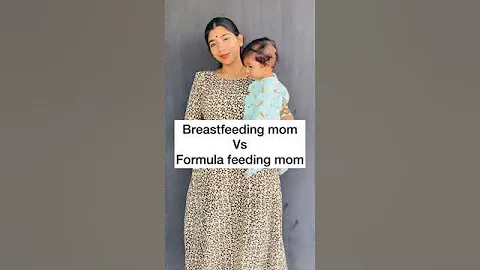Most babies are weaned from breastfeeding until the next child is born. Recently, the government advocated in "Mother Magazine" that babies should be weaned at eight months. This practice is often practiced by middle-class mothers, but it is far from a common practice among Japanese. Breastfeeding is very much in line with Japanese sentiments. They think that is a mother's greatest joy. People who gradually adopted the new habit viewed the shortened lactation period as a sacrifice that the mother endured for the well-being of her child. They agreed with the new regulations and believed that "long-term breastfeeding is not good for the child's health" and criticized mothers who did not wean their children as being self-indulgent and lacking self-control. They said: "She said she couldn't wean the baby, but that's not the case", "That's because she couldn't make up her mind", "She just wanted the baby to keep sucking her milk", "It was for her own happiness". Because of this attitude, the practice of weaning at eight months is certainly unlikely to become widespread. There is also a practical reason for late weaning. The Japanese do not have the habit of giving special foods to newly weaned infants. Weaned children should be fed gruel, but most of them switch from breast milk to ordinary adult food at once. The Japanese diet does not include milk. Also they don’t prepare special vegetables for babies. Under such circumstances, there are natural reasons to doubt whether the government's advocacy of "long-term breastfeeding is bad for the child's health" is correct.
Babies are generally weaned after they can understand what others are saying. Before that, the mother would sit at the family dinner table with her baby in her arms and feed her some food. They eat more food after weaning. At this time, some children still need to drink breast milk, and feeding becomes a problem. It's easier to understand for a child who has to wean after having another child. The mother gives them snacks from time to time to keep them from being obsessed with milk. Mothers sometimes put pepper powder on their nipples. But all mothers mock their babies and say that if they want to nurse, they are still just little babies. They said: "Look at your cousin, he is an adult! He is as young as you, but he doesn't want to breastfeed." "Look! That kid is laughing at you. You are already an older brother and you still have to breastfeed." Children who are two, three, or even four years old and still playing with their mother's nipples will suddenly let go of their nipples when they see an older child walking in, pretending that nothing happened.
uses this ridiculing method to urge children to become adults early, and it is not limited to weaning. Use these methods in any situation from the time the child can understand speech. For example, when a boy cries, his mother will say, "You are not a girl," "You must know that you are a boy!" and so on. Or: "Look at that child and you won't cry." When a guest brings a child to visit, the mother will kiss the guest's child in front of her own child. And she said: "I want this little baby. I like to have such a smart and good baby. You have grown up and are still naughty." At this time, her own child will fly up to her mother and use her fists to Beating the mother while crying: "I'm not happy, I'm not happy! I don't like this baby, I listen to my mother." When a one or two-year-old child is noisy or not obedient, the mother will say to the male guest: "Please take this child away from us. We don't want him in our house anymore." Guests will also assume this role and begin taking the child away from their home. So the child cried out to his mother for help, like he was crazy. When the mother saw that the ridicule had completely achieved its purpose, she pulled the child to her side and asked the still sobbing child to swear that he would never be naughty again. This kind of small comedy is sometimes performed for children as young as five or six years old.
There are other forms of mockery. The mother walked to the father and said to the child: "I don't love you, I love your father, because your father is a good man." The child was extremely jealous and wanted to separate his father and mother. The mother said, "Dad is not like you. He doesn't yell or run around at home." So the child stamped his feet and said, "You lied! I didn't do that. I'm a good boy. You Don’t you like me?” Enough of the joke, the parents looked at each other and laughed. They not only used this method to mock the boys, but also the girls.
This experience is fertile ground for developing a distinct fear of ridicule and contempt in Japanese adults. We are not sure how old a child is before he understands what kind of teasing is meant to make him laugh, but sooner or later he will.Once understood, this awareness of being ridiculed is combined with the fear of losing all security and intimacy. This fear from early childhood still lingers when you are laughed at by others as an adult.
The reason why this kind of ridicule can cause greater panic in the hearts of children between the ages of two and five is that the family is indeed a paradise of safety and comfort. There is a clear division of labor between father and mother, both physically and emotionally. They rarely appear as competitors in front of their children. The mother or grandmother takes care of the housework and educates the children. They all bowed to serve and worship their father. Seating in the family hierarchy is very clear. Children know that older people have privileges, that men have privileges that women do not have, and that older brothers have privileges that younger brothers do not. However, during the early years of his life, a child is pampered by everyone in the family, especially boys. Whether it is a boy or a girl, mother is always the one who promises to fulfill any wish. A three-year-old boy can unleash his nameless rage on his mother. He never showed any resistance to his father, but he could get angry with his mother and grandmother, venting his anger at being teased by his parents and being "given to others". Of course, all boys are not necessarily grumpy. However, whether in rural areas or in upper-class families, bad temper is a common problem among children between the ages of three and six. The child kept hitting his mother with his fists, crying and fussing with all his might, and finally messed up his mother's cherished hair bun. Mother is a woman. And he, even at three years old, was undoubtedly a man. He even took pleasure in violent outbursts and unprovoked attacks.
A child can only show respect to his father. To the child, the father is the representative of the higher level in the hierarchy. In common Japanese terms, "for the sake of training," the child must learn to show due respect to his father. Japanese fathers are less responsible for educating their children than fathers in almost any Western country. The education of children was left entirely to women. When a father has any requirements for his children, he usually just indicates with his eyes or just gives a few words of admonishment. And, since this was so uncommon, the children obeyed immediately. In his spare time, he makes toys for his children. After the child has learned to walk, the father sometimes hugs the child and carries him back and forth (of course the mother also carries him). For young children of this age, Japanese fathers sometimes do some childcare work, while American fathers generally entrust it to the mother of the child.
Children can be as coquettish as they want to their grandparents. Although grandparents are also respected objects, they do not assume the role of educating children. Although some grandparents are dissatisfied with the lax early childhood education and take on the role of education themselves, this will cause a lot of contradictions after all. The grandmother usually stays with the child all day and night. Moreover, in Japanese families, it is extremely common for mother-in-law and daughter-in-law to compete for children. From a child's perspective, he can be favored by both parties. From the grandmother's perspective, she often uses her grandson to suppress her daughter-in-law. A young mother has to please her mother-in-law, which is the biggest obligation in her life. Therefore, no matter how much the grandparents pamper their grandson, the daughter-in-law cannot raise any objection. Often, when the mother says she can no longer give candies, the grandmother immediately gives them again, and insinuates, "The snacks grandma gives are not poisonous." In many families, the grandmother gives the children things that the mother cannot get. , she also has more free time to play with her children than her mother.
Brothers and sisters are commanded to pamper their younger siblings. Japanese young children will fully feel the danger of being "seized" when their mother gives birth to another child. A child who has fallen out of favor can easily imagine that the breast milk and mother's bed that he has always been intimate with will be given over to the newborn baby. Before a new baby is born, the mother will tell the child: This time, you will have a living doll instead of a "fake" baby. From now on, you will not sleep with the mother, but with the father, and make it seem like it is a baby. kind of privilege. Children are interested in various preparations for the birth of a new baby. When a new baby is born, the child usually feels genuine excitement and joy, but this excitement and joy soon fades. Everything is expected and does not feel particularly uncomfortable.A disgraced toddler always wants to take the baby somewhere else. He said to his mother: "Give this baby to someone else." So the mother replied: "No, this is our baby! Let us all like him. Babies love babies, you have to help mom take care of them Baby, how are you?" This scene sometimes goes on for a long time, and the mother doesn't seem to mind. In a family with many children, an adjustment automatically occurs. The children will form partners in order of intervals. The eldest child will take care of the third child, and the second child will take care of the fourth child. The younger brothers and sisters are also close to the brothers and sisters who are next in order. Until the age of seven or eight, differences between men and women have little bearing on this arrangement.
( ruth-benedict )






















